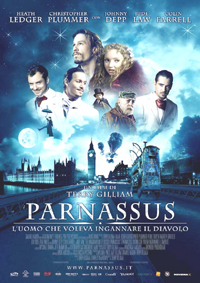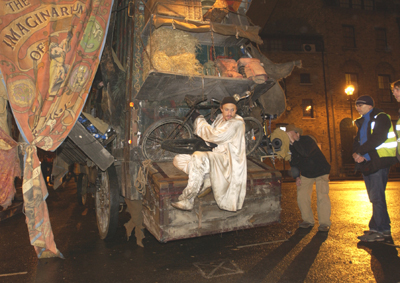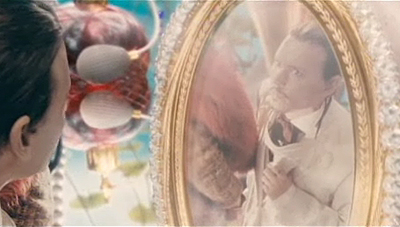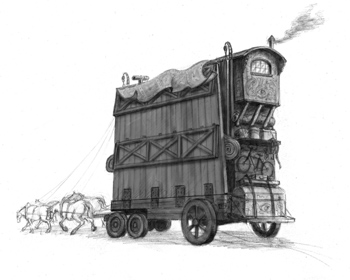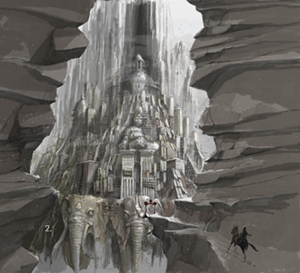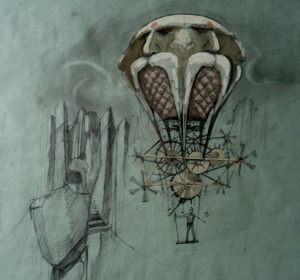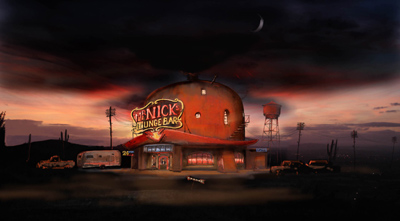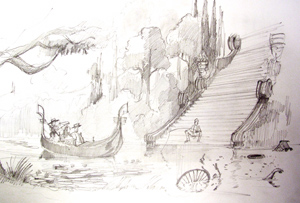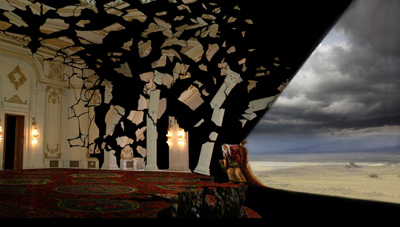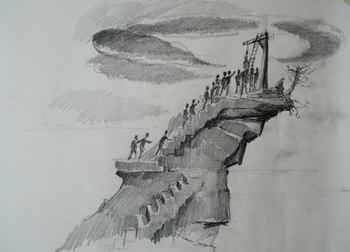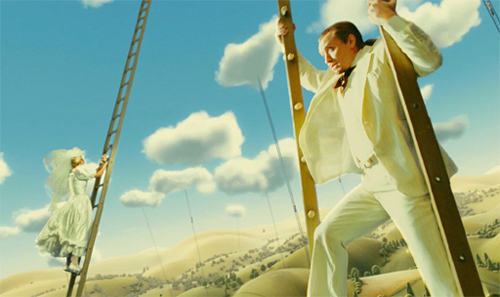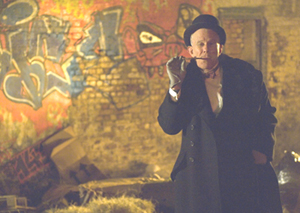THE TERRY GILLIAM FILES // "IMAGINARIUM" (2009) |
Extended Interview: Terry Gilliam | 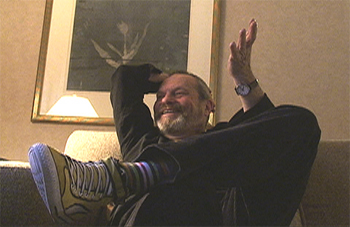 |
|
A few weeks before the U.S. opening of THE IMAGINARIUM OF DOCTOR PARNASSUS, and after already having traveled with the film to numerous festivals, conventions and debuts in other markets around the world, Terry Gilliam sat down to discuss the film's dramatic road to completion. Gilliam: It's all becoming a big blur, everything, life — the whole thing's just getting very strange. I enjoyed the Python 40th anniversary reunion at the Ziegfeld, though security and press access, I must say, was pretty draconian. Gilliam: It was a blur: in, dah dah dah, out, the whole Python zip-through town. We were doing Python and this at the same time. It was like AGGGGH! It had gotten to the point, finally got a break, and suddenly realized I never want to speak about this film again, and I've got another month. I've got to go to Japan. It's already opened in dozens of places. Gilliam: It's opened in England, it's opened in Italy, it's been in France, Spain. I've been dealing with all of that. I've been to festivals in Europe so it's been going on for probably four months now. Finally, finally it's going to come out here. Everything has been backwards on this film! I mean, to open it in Europe first in certain markets . . . but what's been interesting, it's been a huge success in Italy. Does that take some of the pressure off here? If it's already done well overseas, it doesn't need to prove itself if it were to open here first?
Even though it has Heath Ledger and Johnny Depp? Gilliam: This is what is crazy! Because they're not sure, it doesn't fit into anything that they understand. What's so difficult to understand? You just sell it on those, just completely whore yourself and sell it out loud and it'll work. And they kind of did that in Italy. And what I'm trying to get people to understand is, OK, if the film was not going to perform it would have dropped considerably for the second week. I think it dropped four percent. It works. But there still even now, we sent it to a certain large distribution company with a very famous director involved and they said Oh, it's wonderful, but it's too sophisticated for our audience. We're back into the old TIME BANDITS situation where they don't understand it works from 8 to 80. It's just your attitude in life, and they can't get it. The world has gotten even more tedious than when we began! Where did the financing come from? Gilliam: Zero out of America, so basically it was a UK-Canadian co-production, with presales in France, Germany, Italy, Japan, couple of other places like that. And that's how it was put together. And how much was the total budget? Gilliam: Probably about 30 million. It was 25 when we started. We were out there in L.A. at the end of 2007 saying, 'OK, summer of 2008, DARK KNIGHT, Joker, Heath Ledger will be the Big Star In The Planet, and we'll be coming out a couple of months later.' This very complex idea they couldn't grasp. It's actually terrifying; they're frightened, the people that are running the show. Very few of them have any sense of film, or audiences I think. And I just wish the credit crunch would take a few of these places down. It's actually managed to destroy some of the small distributors, production companies and all — it's horrible. So luckily some people are at the top at the right time. Johnny is riding high still. I can't imagine now, everybody, even the smaller independent operations, they want big names in there. And there's only a few big names. And what's interesting is like, an A list isn't quite the same anymore. There's the A list, and then there's the A-Prime List, and they're really only interested in A-Prime which is about 5 people. Johnny is one of those. Gilliam: That's what I 'm meaning, he's at the right place at the right time. Even without wearing a pirate costume. Gilliam: Yeah, I think so. But it's pirates that count! I think Mad Hatter counts as well. I don't know where to start except with the awful thing that happened. I have to tell you that when I first heard the news about Heath, when it came over the car radio, my first thought was Oh shit!, and the second thought right immediately after that was Oh shit Terry! Gilliam: Once again! Worse than all the other difficulties you'd faced on films all put together, because it not only meant the film was in jeopardy, but you lost a friend.
I wasn't aware of any of that, and I was refusing to listen to any of those problems. I was just despondent, and then Amy just was saying 'We are not going to let this film die. It's gonna go.' She was ruthless with everybody, she was just beating everybody up saying 'Stop.' And I called Johnny, it must have been the next day. The day Heath died we did nothing, we were just out lying on the floor of the office, nobody moved — this is not true — and I called Johnny to commiserate because he was close as well to Heath, and I said, 'I don't know what the fuck I'm going to do, probably go home.' And he said, 'Whatever you do, I'll be there. Whatever you want.' And I think that phone call stopped the retreat of money: Johnny Depp is interested? Oh, he's going to take over the part? I never said anything. I didn't even want to tell them that I'd called Johnny. But that was the thing. And then I went to see Heath's parents on a Saturday in L.A. That was both horrible and wonderful. And I went back to London and just talking and talking to other people. Tony Grisoni said if you want to talk, come in, throw ideas around. Everybody wanted to help in some way. In fact, when I actually decided, 'OK we were three times through the mirror, three people,' rewrote in less than a day, it was very clear: You could do that, you couldn't do that. There were certain things I thought we might be able to find a solution to and we'd march forward. There was a constant readjusting all the time, but basically there's no script changes really. There are all sorts of small things pulling it together once you do that. You make the drunk in the beginning, his face changes. You add lines like when Johnny appeared, she goes, 'Oh, I always dreamed you would look like this.' That's a line to explain that. And putting the picture of Colin Farrell in the magazine. Gilliam: And what's interesting about that is, that's better. Before it was just a happy family with a three room suite, and now it's a happy family and it's Colin Farrell in there, so that sets up [the transformation]. And almost every one of these changes improves the film. That's why I was saying Heath co-directed this movie after he died. He was telling me You can't do that, you can get away with that maybe. It was pretty seamless. If I didn't know the backstory I wouldn't have guessed the changes in actors wasn't planned from the beginning. Gilliam: I didn't know it was going to work until we got back to London and showed it. We did the first rough assembly and showed it to some people who didn't have any involvement in it. And they assumed it. They assumed it had been written that way. And we asked did you see anything wrong with it? No, everything played perfectly. There were no leading questions! And I said, well that's it, it works. It was all basically just flying on hope and trust that we could pull it off. I didn't know whether it was going to work. I didn't realize the drunk had changed when HE went through the magic mirror in the beginning. Gilliam: Really? I must admit there's other people that have said the same thing. Probably because I didn't know or recognize the actor and wouldn't have picked up on the change in his face. Gilliam: Yeah, some people miss that, others get it straight away. I mean, the guy looks completely different from the one that starts! [Laughs! ] It's so dense with imagery that you lose things. You don't notice the guy's got a different face — yet he's completely different! That's what's funny when Johnny appears. So many people think it's Heath!
It's really funny, the great thing is we're here for nine months in the editing room, we're still dealing with Heath every day. He's on film. It's very weird the power of, he's dead but he's not, I'm working with him every day. It's an interesting way to grieve. I worry about everyone who might die before me — reediting them during the grieving process. Was there any thought given to doing CGI of him, a la Benjamin Button or Gollum? Gilliam: We rejected that almost immediately. It was going to be what you see there is Heath, and that was it, except for these sort of transitional moments. There were scenes I thought I could pull off with a double, in the end I rejected it 'cause it didn't work. No, the CG thing was rejected within the first week. We've got some other tricks I'm not revealing but what you see on screen is always Heath. Where did the idea come from that the replacement actors had to be friends of Heath? Gilliam: I just wanted to keep this family, it's as simple as that. I just wanted to keep it a close-knit group of people. There were people even offering to come and help, they didn't know Heath. I just, it had to be in the family somehow. I don't know why, it was my attitude. That's why the idea of getting someone to replace Heath? No, there is no one guy that can replace Heath Ledger. Three spreads the load. And then friends, I think it worked because Colin at one point had said he actually thought he was channeling Heath at one point. Heath's spirit was quite exceptional to say the least. Powerful, he just was there. His presence just never went away for a while. And that I think just helped enormously. The guys had no time to rehearse. I wasn't even sure how one would approach it. There were some weird things: The night we shot the material when the theatre is reconstructed with the checkerboard pattern and all that, and Heath was on stage and the Russians are appearing, and I said because he was behaving in a very funny way, a funny way of moving, 'Heath, I know what the fuck you're doing.' He said, 'What are you talking about?' 'You're doing Johnny Depp, aren't you?' Oh Fuck! And can you believe that helps this transition. This was not intended. It's like Jude, we made this book to try to get the money for the movie, and at the time before Heath had jumped on board I was talking to Jude about playing the part. And we did these beautiful paintings, pre-Heath paintings, and the ladder sequence Jude is on the ladder. And I mean this is crazy, but he ends up on the ladder in the film! That weird thing about Heath doing Johnny and then Johnny ends up doing Heath, there were a lot of little connections that were intriguing all the way through it. Heath was busy practicing his comic skills, too. I was pretty convinced that ultimately, there was nothing he could not do. He was just getting better, trying this, trying that, learning all the time. I thought his comic timing was perfect. And what was interesting about it was always grounded. It wasn't the character showing off in any way. It was the character again. It was funny! What directions did you give to Johnny, Jude or Colin to continue that character? Gilliam: I didn't. So they played it as they thought Heath might have played it? Gilliam: Yep. Just guessing, feeling their way. The most difficult one was Colin, and the transition to Colin was a very hard one. Because Heath is running around on stage, there's this incredible energy, and so it's the one bit we reshot because we tried it with energy and it didn't work. Because there's an interesting thing: Heath even at this point now in the film you can see he's a liar and a cheat, he's almost Mephistophelean the way he's working with Parnassus. He's a bad guy [yet] you still love him. And then you cut to Colin and he looks like a bad guy, he looks like a Victorian villain — he's got a widow's peak, beetle brows, the man has a dark, dangerous, villainous face and that was a really hard transition to pull off. And we reshot it playing it a different way, and we eventually got it because it had to be light and humorous. We then did something in the cutting which helped in the transition — we delayed the reveal to his face by cutting to the magazine first, before you see him. We played around with that quite a bit, and finally it works. But that was a harder one. Jude was easier. Jude was nice, open energy and that works.  Johnny, we had Johnny for one day and three-and-a-half-hours, that's all. Because of his schedule? Or was it all you could afford? Gilliam: No, we almost didn't get him almost. It was only at the very last moment that Michael Mann's film PUBLIC ENEMIES was delayed by a week. Because he was in prep and Michael Mann was not going to let him go. He was very much controlling what Johnny could or could not do. (Control the performance to the point it's not there!) And so literally he just arrived and on the set and go! That was it, we just went and he had worked it all out, he was word perfect. He's just extraordinary. And he just found his own way of making it work. That's why I put Johnny in first position because number one, he was going to be the most difficult to get any time with, and number two I just thought if it works with the transition to Johnny and the audience goes for it, they'll follow the next two. And that's exactly how it works. Johnny's wonderful. I think he ought to make a living just doing walk-on parts, small ones, steal the film and then go home. How was it working with Amy as your producer, since you've had unfortunate experiences with producers on occasion. Gilliam: Hers was a difficult one. And you said she was ruthless? How ruthless was she with you? Gilliam: As much as she could, but that's only so much. She was in an interesting position because Bill Vince was the real producer, and she was his protege. But he was busy dying of cancer through the whole shoot. He really was not well. And so you're sitting there knowing there's going to be a death and it's going to be Bill, we'd be lucky if he doesn't die before we get through the shoot. Suddenly Heath goes and dies on us! Wait a minute! And then Bill managed to last until the last bit of film went through the camera and then two days later he died. He was in terrible shape. Anyway, so Amy's beating up Bill, pushing him, pushing me, she was just this fury, pushing, 'We're going to make this film, this won't work,' and that's what it was like, and then Bill dies and now she's on her own, dealing with this huge insurance claim which is a huge nightmare because they don't want to cough up the money, everything, so she's had to deal with things that more experienced producers probably wouldn't have had to deal with in a life of producing — all in one film. There are days I wanted to just slap her but she's my daughter! So it becomes an interesting thing: you want to go 'I've got more experience, you're just being na�ve, you don't understand.' And she goes 'You can't talk to me like that.' Or else I'll say something and she'll say, 'Why are talking to me like your daughter?' Because you are my daughter! It may be the fact that we're used to arguing and fighting, it gets us through it. It's fine. She's fantastic. I don't know where she's going to go from here because I don't know quite what you do after this kind of experience, whether you stay in it or just get out! But she's been great, she's really good with people. She works incredibly hard, very diligent, just tries to stay on top of everything. She's great, she's very opinionated, she just doesn't like all the lazy bureaucratic people; nobody seems to do their job any more, you discover more and more, they're all just floating along, all the organizations are bloated, they're full of people that aren't dedicated. And she's ruthless about this thing of being dedicated to a film. So she was quite driven through al this. Sounds like the fruit doesn't fall far from the tree. Gilliam: Afraid not! That doesn't mean she's going to have a pleasant life, that's what worries me. It may mean a miserable life!
For the Imaginarium scenes you'd said you didn't want it to look like typical CG imagery, and in the Jude Law sequence for example you'd gone for a look more in the direction of MARY POPPINS.
copyright 2009, 2010 by David Morgan | ||||||||||||||||||||||||||||||||||||







